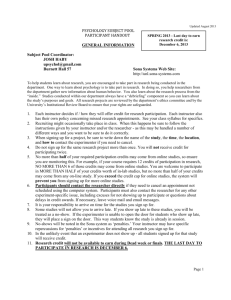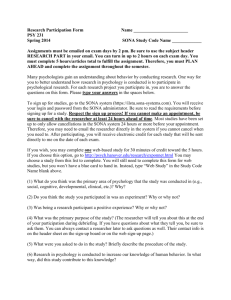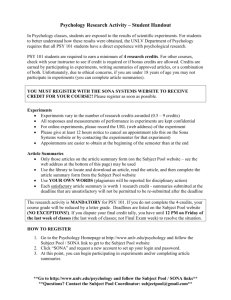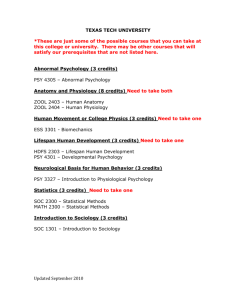General Psychology Research Experience
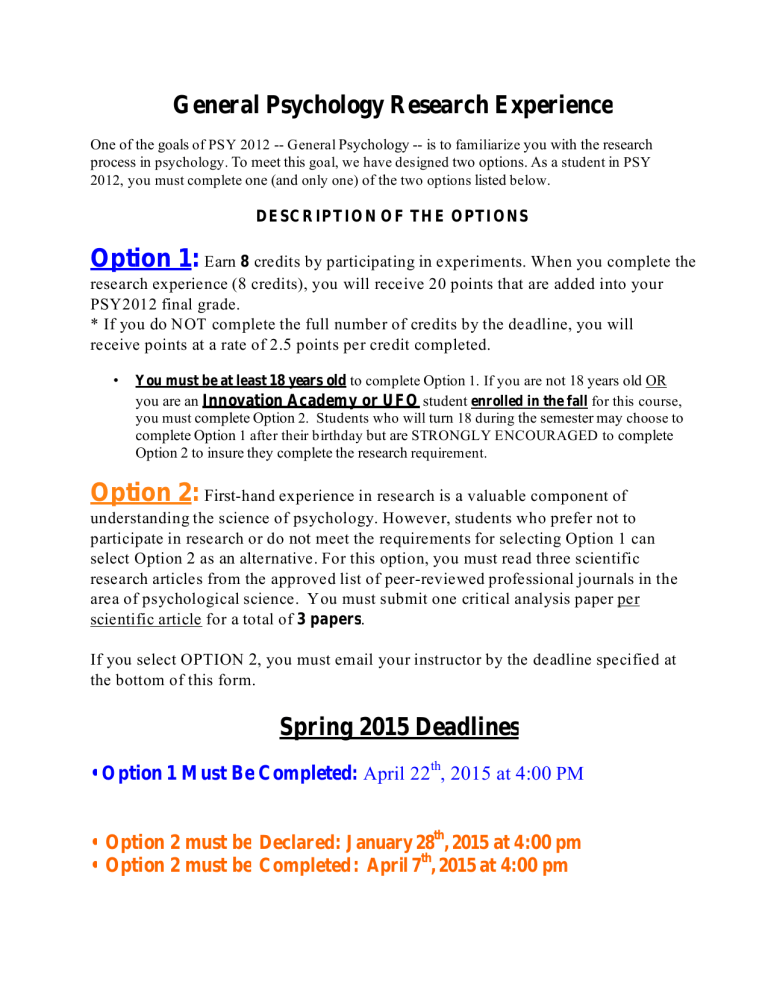
General Psychology Research Experience
One of the goals of PSY 2012 -General Psychology -- is to familiarize you with the research process in psychology.
To meet this goal, we have designed two options. As a student in PSY
2012, you must complete one (and only one) of the two options listed below.
DESCRIPTION OF THE OPTIONS
Option 1:
Earn
8 credits by participating
in
experiments. When you complete the research experience (
8
credits), you will receive 20 points that are added into your
PSY2012 final grade.
* If you
do
N OT complete the full number of credits by the deadline, you will receive points
at a
rate of 2.
5
points per credit completed.
• You must be at least 18 years old to complete Option 1. If you are not 18 years old OR you are an you must
Innovation Academy or UFO
student enrolled in the fall for this course complete Option 2. Students who will turn 18 during the semester may choose to
, complete Option 1 after their birthday but are STRONGLY ENCOURAGED to complete
Option 2 to insure they complete the research requirement.
Option 2:
First
-hand experience in research
is a
valuable component of understanding the science of psychology. However, students who prefer not to participate in research or do
not
meet the requirements for selecting Option 1 can select Option
2
as
an
alternative. For this option, you must read three scientific research articles from the approved list of peer-reviewed professional journals in the area of psychological science. Y ou must submit one critical analysis paper per scientific article for
a
total of 3 papers .
If you select OPTION
2,
you must email your instructor by the deadline specified at the bottom of this form.
Spring 2015 Deadlines
• Option 1 Must Be Completed:
April 2 2 th
, 2015 at 4:00 PM
• Option 2 must be Declared: January 28
th
, 2015 at 4:00 pm
• Option 2 must be Completed: April 7
th
, 2015 at 4:00 pm
INSTRUCTIONS FOR COMPLETING THE RESEARCH EXPERIENCEE
Option 1: Research Participation
Research is a fundamental component of psychological science. Learning about psychology involves learning about the research process, and research participation provides a hands on opportunity to become familiar with how research is conducted. This option gives you experience as a participant in actual psychology experiments. You will also have the opportunity to learn more about yourself and your behavior in these studies. There are many different kinds of studies conducted in our department.
For example, you might be asked to complete questionnaires, to view videos, to listen to music or conversations, to interact with others in a group, or to make judgments on a computer.
All studies are reviewed and approved in advance by the University of Florida Institutional Review
Board. When you arrive at each study, the investigator will explain that particular study to you and you will have a chance to ask any questions you may have about participation. If you do not wish to participate, you will receive 1 credit for the time required to get to the location of the experiment and be allowed to leave. If you decide to participate in the study, you will be given a written explanation of the study and asked to give your consent to participate. Even after you have cons ented and have started to participate, it is always up to you to decide whether to continue — you can discontinue your participation at any time.
HOW TO REGISTER FOR PARTICIPATION
The sign -up procedure uses a webbased system called Sona Systems , which mea ns you will sign up for studies online. The procedure for signing up for experiments is detailed below. If you are still confused after reading this document, check the Frequently Asked Questions (FAQ) document below. The FAQ is also on the Sona Systems Webpage.
I.
Setting up an account and password.
The first time you use Sona Systems, follow the steps below to set up an account for yourself and indicate your course section:
Step 1: With any Internet browser, go to: http://ufl.sona
systems.com
. Under the New User section on the left side of the screen, click on the “ request an account ” link. Next , enter the following information:
First name: enter your First Name as it appears on your Gator1 card
Last name: enter Last Name as it appears on your Gator1 card
User ID: enter your Gatorlink username
Re-enter User ID: enter your Gatorlink username again
Student ID: enter your UF ID
Select course: Select your course
Step 2:
A logon and password will be sent to your email account within 24 hours, although in most cases it will be sent in less time. The email will contain a link to the Sona Systems website, so that you can immediately login. If you do not receive a logon and password shortly after you have signed up ( wait at least 24 hours for the email to arrive), it is most likely due to complications with the email address you provided.
A ny problems with your Gatorlink email should be directed to the UF computing help desk at (352)
392 HELP (4357). If you continue to have problems with the Sona Systems webpage, contact the
participant pool coordinator at psy 2012@clas.ufl.edu
. NOTE: Do NOT use AOL accounts.
Doing so will prevent you from receiving important emails.
Step 3: To login, navigate to: http://ufl.sona
systems.com
using an internet browser and type in your Gatorlink username and the password you received. Under “My P rofile,” you can change your password as well as any other your password
, go to personal information (e.g., your phone number). If you forget http://ufl.sonasystems.com/ and on the left side of the screen under “Your
Password,” click on “R etrieve Password.” You will be sent your password via email.
III. Signing up for experiments
After you have set up your account, you may sign up for research projects. The first study you will probably complete is an online prescreening study. You will receive 1 credit for this study, and it will appear on the screen after you login. The online survey will be available throughout the semes ter. If you do not complete this online study in the beginning of the semester, however, there is no penalty.
Step 1: Using an internet browser navigate to http://ufl.sona
systems.com
and login with your username and password. To view available studies, click on the study sign up icon. This will bring up a list of studies. You may view the schedule of available times by clicking on the specific study in which you are interested . You can then view the number of credits the study awards and amount of time required to complete the study. To view available time slots, click on the link provided, and you will see additional information including the location of the study.
Step 2:
When you find a study that fits your schedule, simply click the “ Sign Ups ” button . Once you have clicked the button, you will be signed up for th e study you selected . It is very important that you write down the day, date, time, and location of t he experiment in your calendar.
Step 3: You will receive a confirmation/reminder email about 24 hours before the scheduled time of the study. To receive a reminder, you need to make sure your email address is correct in the online signup system. To verify or change your email address, go to http://ufl.sona
systems.com
and click on the “My Profile” icon at the bottom of the screen and adjust your contact information as needed. If your email address isn't there or is incorrect, you can type another address in the Alternate Email
Address box. However, note that if you type in an alternate email address, all emails from the website will be sent to the alternate email address.
Step 4: On the date and time of the study, go to the location of the study. If you have any questions about the location of the study, please email the person listed as the Researcher under the study description. After arriving at the experiment, you will first be given a description of the experimental procedures and asked to sign a consent form. If you do not wish to participate in the study at this time, tell your experimenter, and you will be given 1 credit for showing up for the study.
After you have completed the experiment, the researcher will assign you credit via the website.
Please allow researchers 1 week after the study has ended to formally assign you credit on the
SONA website.
You can keep track of the credits you have earned by going to the website, clicking on “ My Schedule/Credits ” and logging in. The experiments in which you have participated and the number of credits you have earned, as well as any outstanding appointments , will be listed there.
NOTE: There is a limit on the number of credits you can earn through online studies ( 6; not including the prescreening questionnaire).
IV. Canceling an appointment.
If you must cancel your appointment, be sure to remove your name from the web sign up page under
“ My Schedule/Credits ” as soon as possible, so that another student may take your spot in the study.
If you cancel more than 24 hours before the session is to begin, Go to the Sona Systems website and find your initials next to the date and time you signed up. Click the "Cancel" button to the right of your initials. If you cancel within 24 hours before the session begins , you must call the re searcher
.
Please do NOT call the Psychology office, your TA, or instructor with information about cancellations, as these people are in no way involved in this procedure.
IMPORTANT NOTES:
1. If you forget the date, time, or room number for your session, go to systems.com
, log on, and click on “ My Schedule /Credits.” http://ufl.sona
-
Once you log in, you can see a list of any projects for which you are enrolled. You can then verify the date, time, and location, as well as the researcher's contact information.
You will be able to track the credits you have earned for participation in research studies by viewing the “My
Schedule/Credits ” page. Check periodically to make sure that your credit s ha ve been correctly applied. If you discover a problem, contact the researcher as soon as you can. If you think that the Sona system is incorrect, send an email to psy 2012@clas.ufl.edu
.
2. In this document you will find information related to the deadline for completing your research experience. Pay close attention to the deadline as once it has passed, you will no longer be able to earn credits, which will directly affect your PSY2012 grade.
OPTION 2: Writing summaries of research studies already completed.
This option is designed to give you exposure to the research that psychologists conduct by reading and reporting on completed experiments that have been published in peerreviewed, professional psychology journals.
Students who decide on Option 2 mus t declare their intentions via instructor by 4:00 PM January 28 th
, 2015 email to their section
(please do NOT email the Participant Pool
Coordinators if you are choosing Option 2).
After the specified time, the paper option
CANNOT be selected.
Step 1.
Locating a research article.
The UF library has a variety of professional, peer reviewed journals in the field of psychology. You can either go physically to Library West or the Health Center Library, or you can visit the library online at http://www.uflib.ufl.edu/ . If you are off campus, remember to click on the green “Off -
Campus Access” button on the left side of the screen. (If you are on campus, this step is unnecessary.) Once you have access to the library resources, click on the “Online Journals” tab at the top of the webpage. Now you can search for relevant journals. Only professional journals in
Psychology are acceptable. Here are some journals from which you can choose:
•
•
•
•
Psychological Science ( recommended )
Journal of Experimental Psychology
Journal of Personality and Social Psychology
Developmental Psychology
•
Cognitive Psychology
Select 3 articles from one of the above journals that describes one or more experiments. Be sure to choose articles that are empirical (i.e., a study was conducted). Do not select theoretical articles. Your instructor or TA can assist you in determining whether your articles are acceptable.
Step 2. Format of the critical analysis.
Please have your reports conform to the following guidelines: a.
Include a photocopy of each of the 3 articles, including the reference list provided at the end of the article. b.
The written report of each article must be typed, three pages in length
1inch margins on all sides. You must use
, double-spaced,
Times or Arial 12 point font .
with c. Use headings within your paper to organize your critical analysis.
d.
Consider using a report folder to bind both the three articles and three critical analyses together.
Step 3. Coverage.
Include information that responds to the following questions: a.
What was this article about (i.e., briefly summarize the purpose, methods, results, and conclusions)? This part should be 1 to 1.5 pages in length.
b.
Why did you choose this particular journal or article? This part should be around hal f a page in length.
c.
How understandable or usable was the article to you? (If it seems vague or impossible to understand, feel free to say so.) This part should be around half a page in length.
d. What did you learn as a result of your reading and how did th is article relate (if at all) to class material? This part should be .5 to 1 page in length.
Step 4. Turning it in.
The typed papers and complete articles should be turned into your instructor’s mailbox office of the Psychology Department . Papers must be submitted by 4 PM on April 7 th in the main
, 2015 .
They will be graded on a pass fail basis. Be sure to include the following information on a cover page to your critical analysis packet:
•
•
•
YOUR NAME
YOUR UFID NUMBER
YOUR INSTRUCTOR'S NAME

